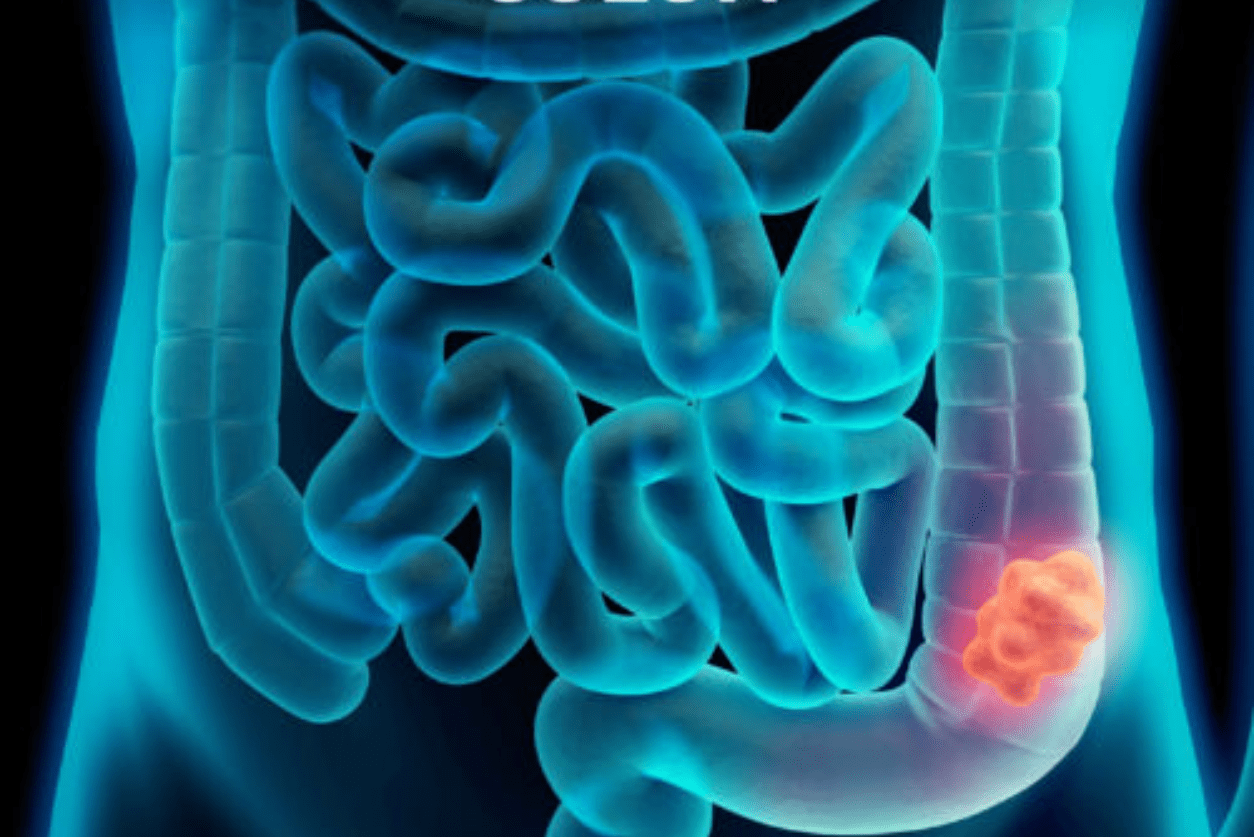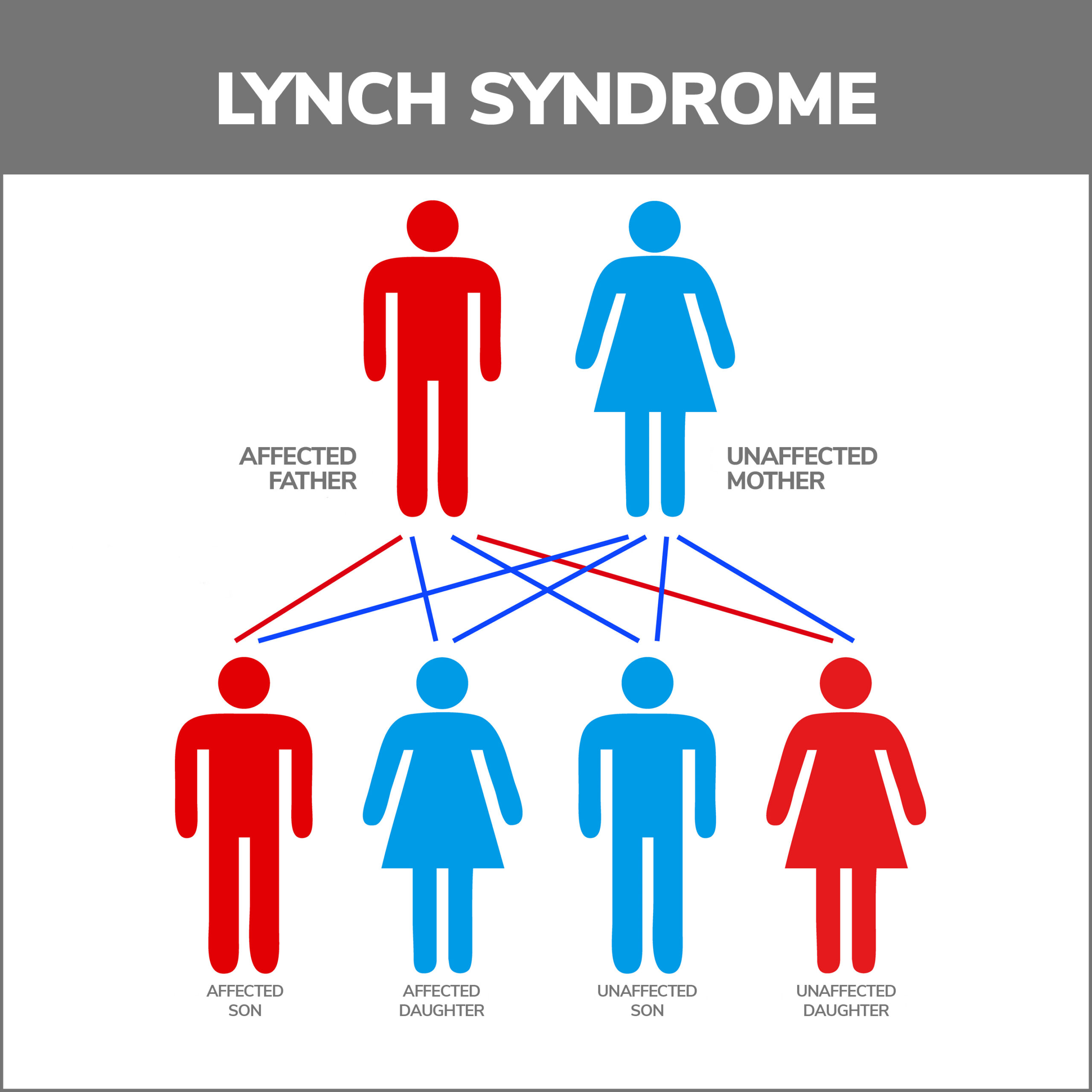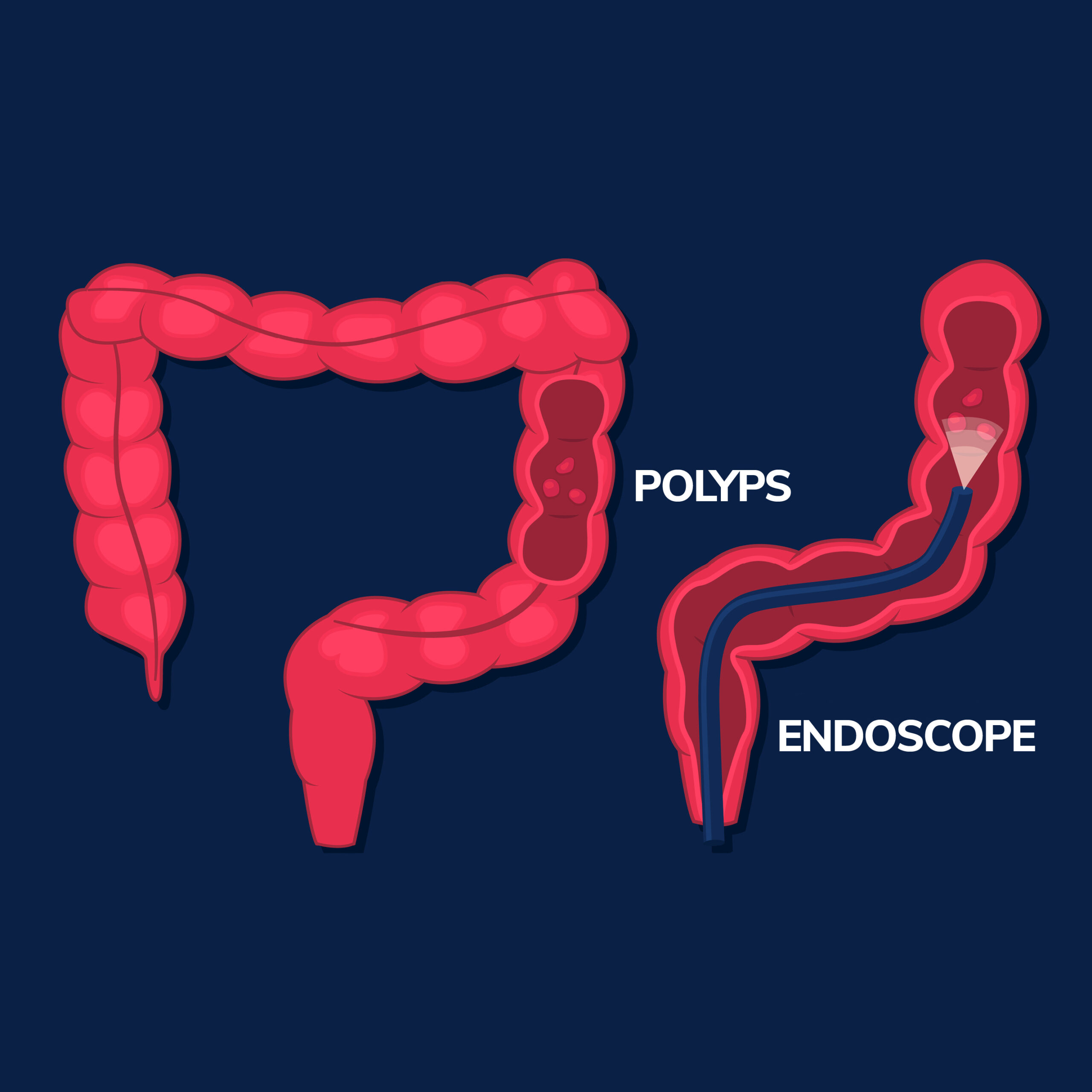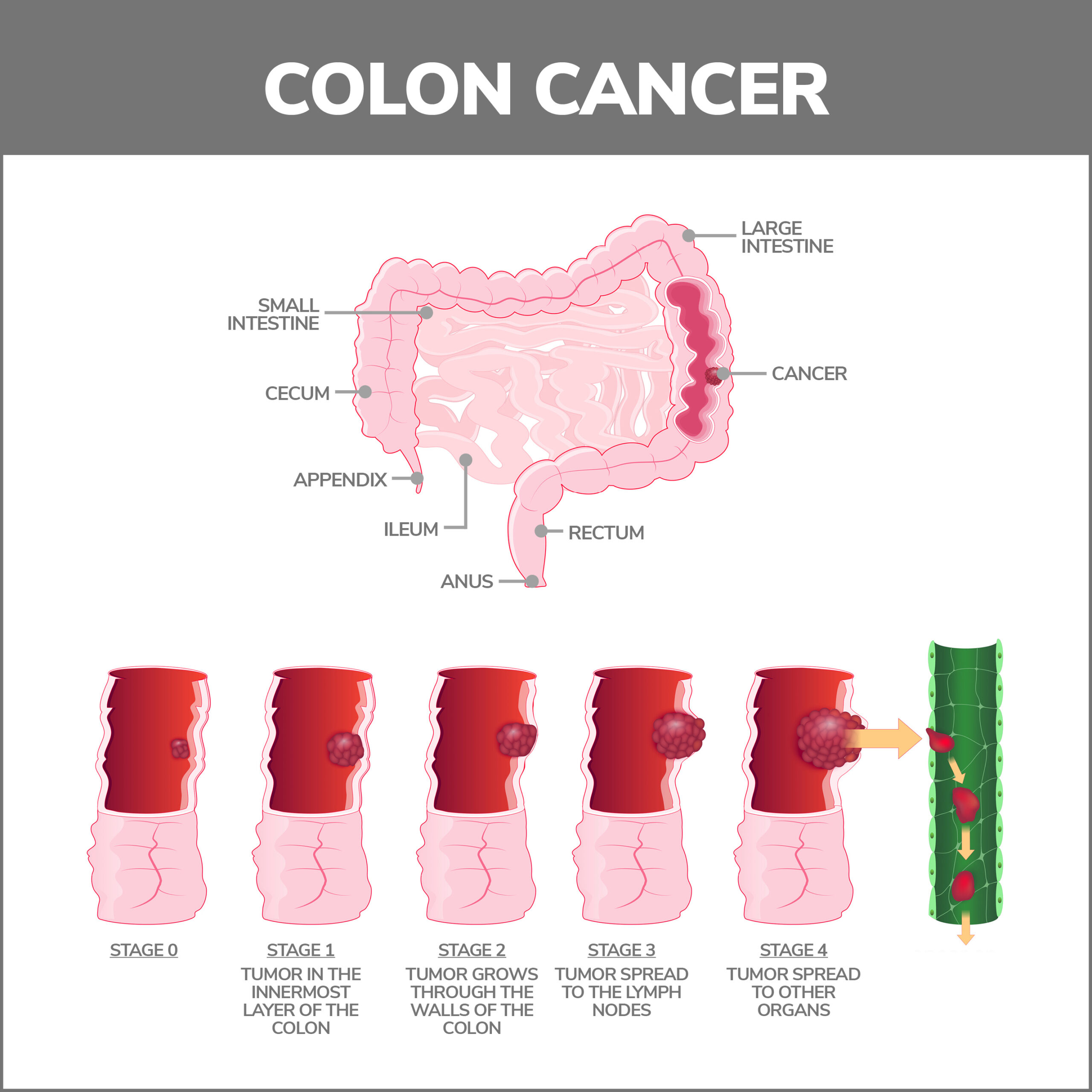
Cancer of the Colon
Not counting skin cancers, colorectal cancers are the third most common type of cancer in the United States. According to the National Cancer Institute, more than 145,000 people in this country are diagnosed with colorectal cancer each year.
So, while colon cancer may not be talked about as often as other cancers like breast cancer, prostate, or lung cancer, it’s actually one of the leading causes of cancer deaths. And it’s for this reason that it’s crucial to stay on top of your colon health.
What is the colon?
The colon is your large intestine, the long, upside-down U-shaped tube that is toward the end of the line for getting rid of waste in your body.
It moves and processes digested food through your body and down towards the rectum, where it exits the body as stool. There are several parts of the colon, including:
- Ascending colon: This section is where undigested food begins its journey through the colon. Undigested food moves upwards through this section, where fluid is reabsorbed more efficiently.
- Transverse colon: Moving across the body, the transverse colon takes the food from one side of the body to the other.
- Descending colon: Once the food has traveled across the top through the transverse colon, it makes its way down through the descending colon.
- Sigmoid colon: The final section of the colon, this part is shaped like an “S,” and it is the last stop before the rectum.
Who is at risk for colorectal cancer?
Every one of us is at risk for colorectal cancer.
About 10% to 30% of people have a family history of the disease. Yet roughly 75% of people who get colorectal cancer do not get it because of genetics. So, you can do something about it.
Although the exact cause for the development of pre-cancerous colon polyps is not known, some factors increase a person’s risk of developing them:
- People older than 45.
- If you are of African American or of eastern European descent.
- Eating a lot of red or processed meats.
- Currently have colorectal polyps.
- Have inflammatory bowel disease (Crohn’s or ulcerative colitis).
- Have a family history of colon cancer.
- Some inherited diseases also increase the risk of developing colon cancer. One of the most common is called Lynch syndrome.

There are lifestyle factors, too:
- You may be at increased risk for developing colorectal cancer if you drink alcohol, use tobacco, don’t get enough exercise, and if you are overweight.
- Smoking increases the risk of pre-cancerous polyps and colorectal cancer.
- A diet high in fat and calories and low in fiber, fruits, and vegetables has been linked to a greater risk of developing colorectal cancer.
The good news is that any lifestyle factors that increase the risk of colorectal cancer can be modified to lessen that risk.
Signs not to be ignored:
- Pain in your abdomen.
- Blood in your stool.
- Weight loss for no known reason.
- Narrow stools.
- Unexplained anemia.
- Diarrhea, constipation, or other change in bowel habits.
But hopefully, you’ll get diagnosed before you have any symptoms, during a regular screening test like a colonoscopy or sigmoidoscopy. These tests use special instruments to see inside your colon and rectum to look for any cancerous or pre-cancerous growths, called polyps.
If your doctor discovers that you have colon cancer, unfortunately, you’ll need to have a few more tests, including scans of your abdomen, to find out whether cancer has spread, and if so, where in your body it’s located.
Detecting Cancer of the Colon
So, how is colon cancer treated? That depends on how aggressive your cancer is and how far it’s spread, but usually, colon cancer is removed with surgery or killed with chemotherapy or radiation.
Fortunately, colon cancer is one of the more treatable cancers
You can be cured, especially if you catch it early. Early diagnosis can often lead to a complete cure.
Spotting colon cancer when it’s still treatable is up to you. Regular physical activity and eating at least some fruits and vegetables daily, perhaps with unprocessed wheat bran, can help prevent it. You’ll also want to avoid processed and charred red meats, smoking, excess calories, and alcohol to prevent colon cancer.
If you’re over age 45, you need to get screened. Through screening tests, colon cancer can be detected before symptoms develop. Your doctor will perform a physical exam and press on your belly area. The physical exam rarely shows any problems, although the doctor may feel a lump (mass) in the abdomen. A rectal exam may reveal a mass in people with rectal cancer but not colon cancer.
Specific tests are used to screen for colon cancer. A sigmoidoscopy, or more likely, a colonoscopy, is done to evaluate any normal results. Only a complete colonoscopy can see the entire colon. This is the best screening test for colon cancer.

Blood tests may be done for those diagnosed with colorectal cancer, including:
- Complete blood count (CBC) to check for anemia.
- Liver function tests.
What if I have polyps?
There are a variety of colorectal polyps, but cancer is thought to arise mainly from adenomas and sessile serrated lesions, which are pre-cancerous polyps.
If a polyp is found during a colonoscopy, it is usually removed. Polyps removed during colonoscopies are then examined by a pathologist and evaluated to determine if they contain cancerous or pre-cancerous cells. Based on the number, size, and type of pre-cancerous polyps found during colonoscopy, your healthcare provider will recommend a future colonoscopy for monitoring (surveillance).
If you are diagnosed with colorectal cancer, more tests will be done to see if the cancer has spread. This is called staging. CT or MRI scans of the abdomen, pelvic area, or chest may be used to stage the cancer. Sometimes, PET scans are also used.
Stages of colon cancer are:
- Stage 0: Very early cancer on the innermost layer of the intestine.
- Stage I: Cancer is in the inner layers of the colon.
- Stage II: Cancer has spread through the muscle wall of the colon.
- Stage III: Cancer has spread to the lymph nodes.
- Stage IV: Cancer has spread to other organs outside the colon.
Blood tests to detect tumor markers may help the doctor follow you during and after treatment.

Treatment
- Treatment depends on many things, including the stage of the cancer. Treatments may include:
- Surgery – Stage 0 colon cancer may be treated by removing the tumor using a colonoscopy. For Stages I, II, and III cancer, more extensive surgery is needed to remove the cancerous part of the colon. This surgery is called a colon resection (colectomy).
- Chemotherapy – Most people with Stage III colon cancer receive chemotherapy after surgery for 3 to 6 months. This is called adjuvant chemotherapy. Even though the tumor was removed, chemotherapy is given to treat any cancer cells that may remain.
- Chemotherapy is also used to improve symptoms and prolong survival in people with Stage IV colon cancer. You may receive just one type of medicine or a combination of medications.
- Radiation – Radiation therapy is sometimes used for colon cancer. Treatment directed at the liver can be used for people with Stage IV disease that has spread to the liver. This may include:
- Burning the cancer (ablation).
- Delivering chemotherapy or radiation directly into the liver.
- Freezing the cancer (cryotherapy).
- Surgery.
- Targeted therapy:
- Targeted treatment zeroes in on specific targets (molecules) in cancer cells. These targets play a role in how cancer cells grow and survive. Using these targets, the drug disables the cancer cells so they cannot spread. Targeted therapy may be given as pills or injected into a vein.
- You may have targeted therapy along with surgery, chemotherapy, or radiation treatment.
Outlook
Often, colon cancer is treatable when caught early.
How well you do depends on the cancer stage and other factors. Many people survive at least five years after diagnosis when treated at an early stage. This is called the 5-year survival rate. If the colon cancer does not return (recur) within five years, it is considered cured. Stages I, II, and III cancers are possibly curable. In most cases, Stage IV cancer is not thought to be curable, but there are exceptions.
Prevention
It can’t be said enough: colon cancer can almost always be caught by colonoscopy in the early stages, when it is most curable. All adults aged 45 and older should have a colon cancer screening. How often you should have screening depends upon the test being used.
Contact Us
As you can see, colon cancer is something to be taken seriously. But it’s also something you can do something about. Our team has both the talent and experience to offer you the best prevention and treatment available.
Our practice began more than 15 years ago and has emerged as one of the leading gastroenterology practices in central Florida. We perform a host of diagnostic procedures using state-of-the-art equipment in a friendly, comfortable, and inviting atmosphere where patient care is always a top priority. Contact us today!